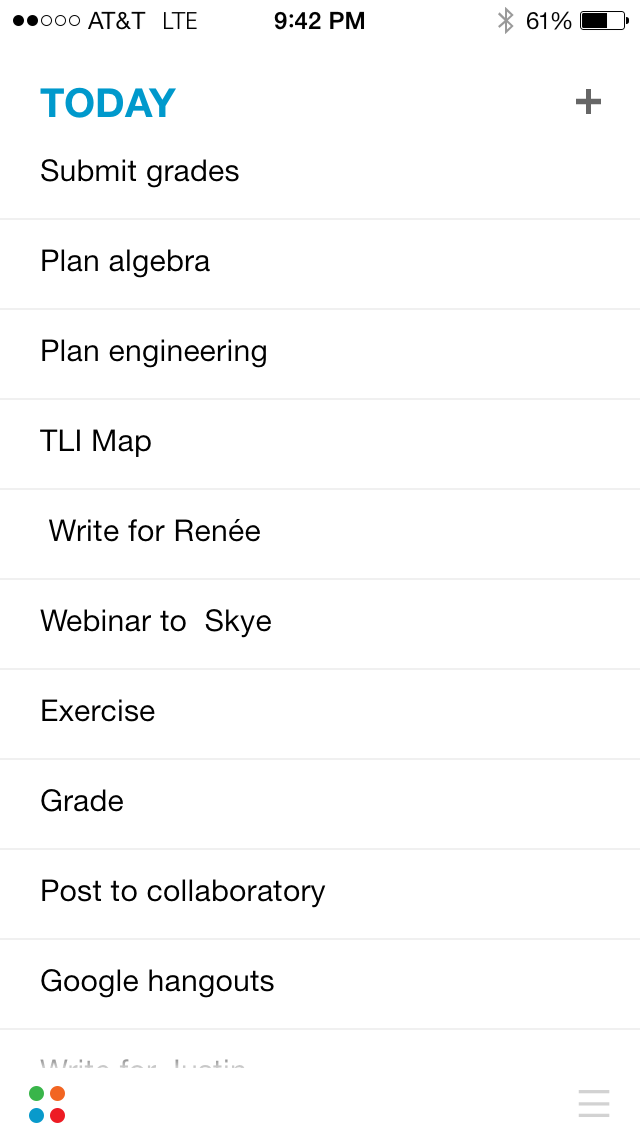How do you handle your work load when you have unstructured time and many tasks that vary in complexity and duration? In my teacherpreneur role I’m learning to balance more tasks with more variety and complexity than ever. I learned I’m not alone at a recent retreat with the current cohort of teacherpreneurs.
Fortunately, I also learned some brain-friendly ways to manage the work.
Backstory
Two self-management tips from my mom were: 1) Get your weekend work finished on Friday evening so you have Saturday and Sunday free; and 2) Do the hardest task first to get it out of the way, then everything else is easy.
Instead of lettering her know I hadn’t done my homework on Friday, I didn’t do it all. And if I successfully avoided the hard tasks, I got out of the easy stuff, too.
But when I started caring about work, and tried to apply her tips, it became clear they weren’t for me anyway.
I discovered that putting in a few hours on Sunday afternoon gets me past the weekend blues and primed for the week. I also get more done by starting with easy tasks. Throughout my National Board work starting with “something easy, then something else” led to many productive hours.
Into The Work of Teacherpreneurism
In my teacherpreneur work, I teach three classes a day and work on four teacher leadership projects with the Arizona K12 Center and the Center for Teaching Quality. As I said, my work is complex and varied. I also have more unstructured time than ever.
In the first semester I decided to do teacher work at school and on Saturdays and “preneur” work at home and on Sundays. When the two blended or there were scheduling issues, I would adjust as needed.
For the first semester, work got done, but I was mentally out of sync. Doing easy work first, like responding to emails, left me in a poor state for mentally demanding work, like writing. But if I switched the order, it was hard to focus knowing I could be doing something that was easier and still important.
The Paradigm Shift
At the teacherpreneur planning retreat, CTQ staffer Kris Kohl presented some new ideas about managing work, based on the books, Rework, by Jason Fried and Manage Your Day-to-Day, by Jocelyn K. Glei.
The paradigm shift was the discovery that I can plan my work around my brain. By looking at the week ahead I can guard the blocks of time when my mind is freshest for the most mentally demanding work – and reserve the rest for other tasks.
With intention and discipline I’m learning to protect the time blocks when I’m most relaxed – at the beginning and end of the day and Sundays for work that demands concentration and creativity. The blocks in the middle of the day, and Saturdays, are reserved for everything else.
The Impact
Managing the workload this way is yielding results. With these boundaries, each type of task gets the focus it deserves. The claim is each type will be done better, and I’ll have the benefit of a more quiet mind. That’s exactly what’s happening. Time will tell if the impact will last.
One Step Further
One of the coolest things about rethinking how I handle my unstructured time is that I’m now reconsidering bell to bell time with students. The old bellwork, announcements, check homework, review, go over new material, practice and close routine has been reordered. Now, the first part of class is dedicated to new material. The kids are fresher and calmer, and I’m hearing more, “I’m finally beginning to get this.” Once the new concepts have been tackled we review, check homework and finish off with announcements.
Yep, brain-friendly planning is for me.









